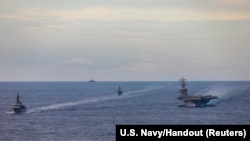On Monday, The United States rejected China’s claims to most of the South China Sea. China then denounced the U.S. position saying it raised tension in the area. And others viewed the move as an election-year political consideration.
In a statement, U.S. Secretary of State Mike Pompeo said China’s claims to most of the South China Sea “are completely unlawful.” He added that China, for years, has been using threats of force against other Southeast Asian coastal countries.
“The world will not allow Beijing to treat the South China Sea as its maritime empire,” Pompeo said.
The U.S. has long opposed China’s growing territorial claims. And American warships have regularly sailed in the important waterway to demonstrate freedom of movement there. Yet Monday’s comments represent a stronger U.S. position on China’s claims.
The U.S. statement supports a ruling four years ago under the United Nations Convention on the Law of the Sea. That ruling rejected most of China’s claims for maritime rights in the South China Sea.
Countries in the area see these waters as highly valuable for international shipping and fishing. About $3 trillion worth of trade passes through the waterway each year.
China claims 90 percent of the sea. It has also built bases on some islands but says its goals are peaceful. Brunei, Malaysia, the Philippines, Taiwan and Vietnam also lay claim to parts of the sea.
A day after Pompeo’s comments, China accused the U.S. of trying to worsen long-standing territorial disputes between China and its Southeast Asian neighbors.
“The U.S. has repeatedly sent… military planes and ships to the South China Sea,” said a Chinese foreign ministry spokesman on Tuesday. He called the U.S. “the troublemaker and destroyer” of peace and stability.
Other reactions to U.S. position
Taiwan welcomed the U.S. statement. “Our country opposes any attempt by a claimant state to use intimidation …. or force,” a Taiwan foreign ministry spokeswoman told reporters.
Other governments avoided direct comment on the U.S. announcement. A Philippines presidential spokesman said “what is important now is … a code of conduct to prevent tension in that area.” Malaysia’s foreign ministry chose not to comment.
Zhu Feng is director of a South China Sea studies center at Nanjing University in China. He said Pompeo’s statement marks a major change in America’s South China Sea policy. He advised against a strong reaction from China, saying that the new U.S. policy is being driven by President Donald Trump’s reelection considerations.
Zhu said Trump “is making the China issue the most important topic for his election to cover his failure in preventing the epidemic...”
A.A. Banyu Perwita agreed that the announcement was a political one meant to take attention from Trump’s weaknesses at home. He is an international relations professor at President University in Indonesia.
“It will be not more than a political diplomatic statement,” he added, saying “we need to make the atmosphere calm now.”
I’m Pete Musto.
Pete Musto adapted this story for VOA Learning English using Associated Press and Reuters news agency materials . Hai Do was the editor. We want to hear from you. Write to us in the Comments Section.
_______________________________________________________________
Words in This Story
allow – v. to permit something
maritime – adj. of or relating to sailing on the sea or doing business (such as trading) by sea
intimidation – n. the act of making someone afraid
conduct – n. the way that a person behaves in a particular place or situation
epidemic – n. an occurrence in which a disease spreads very quickly and affects a large number of people






